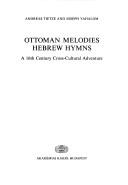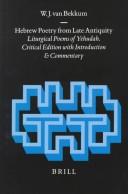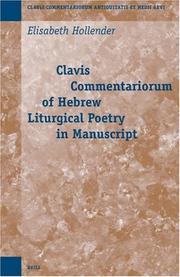| Listing 1 - 10 of 14 | << page >> |
Sort by
|

ISBN: 9630568640 Year: 1995 Publisher: Budapest Akadémiai Kiadó
Abstract | Keywords | Export | Availability | Bookmark
 Loading...
Loading...Choose an application
- Reference Manager
- EndNote
- RefWorks (Direct export to RefWorks)
Sephardic rite --- Hymns [Hebrew ] --- Folk songs [Turkish ]
Book
ISBN: 9004350020 9004021973 Year: 1961 Publisher: Leiden, Netherlands : E. J. Brill,
Abstract | Keywords | Export | Availability | Bookmark
 Loading...
Loading...Choose an application
- Reference Manager
- EndNote
- RefWorks (Direct export to RefWorks)
The Scroll of the Hodayot or Thanksgiving Hymns was found in a cave, generally known as Cave One, in the vicinity of Khirbet Qumran on the northwestern shore of the Dead Sea in the spring of 1947, together with other scrolls and fragments of manuscripts. The Thanksgiving Scroll was found in two parts. One contained three separate folded sheets. The second part was a crumpled mass of some seventy fragments by the time it reached the hands of scholars at the Hebrew University of Jerusalem. The text, on the whole, is poorly preserved. - pages [1] - [4].
Thanksgiving Psalms. --- Hymns, Hebrew --- History and criticism. --- Bible. --- Criticism, interpretation, etc.
Book
ISBN: 0891309187 9004369406 9780891309185 9789004369405 Year: 1985 Volume: 27 Publisher: Atlanta, Ga. Scholars Press.
Abstract | Keywords | Export | Availability | Bookmark
 Loading...
Loading...Choose an application
- Reference Manager
- EndNote
- RefWorks (Direct export to RefWorks)
Jewish hymns --- Hymns, Hebrew --- Angels --- Judaism --- 229*311 --- Angels (Judaism) --- #GROL:SEMI-296*5 --- Hymns, Jewish --- Jews --- Synagogue music --- Jewish religious poetry --- Hebrew hymns --- Qumran: tekstuitgaven --- 229*311 Qumran: tekstuitgaven --- Hymns --- Jewish hymns. --- Hymns, Hebrew. --- Judaism.
Book
Year: 1990 Publisher: Stuttgart : Verlag Katholisches Bibelwerk,
Abstract | Keywords | Export | Availability | Bookmark
 Loading...
Loading...Choose an application
- Reference Manager
- EndNote
- RefWorks (Direct export to RefWorks)
Hymns, Hebrew. --- Poor --- Qumran community. --- Biblical teaching. --- Bible. --- Magnificat --- Thanksgiving Psalms --- Criticism, interpretation, etc. --- Criticism, interpretation, etc. --- Criticism, interpretation, etc.
Book
ISBN: 0817383298 9780817383299 9780817356231 0817356231 Year: 1983 Publisher: Tuscaloosa University of Alabama Press
Abstract | Keywords | Export | Availability | Bookmark
 Loading...
Loading...Choose an application
- Reference Manager
- EndNote
- RefWorks (Direct export to RefWorks)
This is the first in-depth study of three 11th- to 12th-century poets from Balkan Byzantium. Included are all of the known works by Moses b. Hiyya, Joseph b. Jacob Qalai, and Isaac b. Judah, collected from rare manuscripts and printed editions and from Geniza collections at Oxford and Cambridge. These works provide the evidence that the Balkan synagogue poets favored distinctive literary forms even as they show the strong influence of the Hispanic-Hebrew writers. Completing the volume are indexes of rabbinic, Aramaic, and payyetanic usages and tables of metonymical terms.
Hebrew poetry --- Piyutim. --- Piyyutim --- Hebrew poetry, Medieval --- Hymns, Hebrew --- Jewish hymns --- Jewish religious poetry, Hebrew --- Judaism --- Hebrew literature --- Liturgy --- Hebrew poetry. --- Hebrew literature. --- Jews --- Jewish literature --- Literature
Book
Year: 2009 Publisher: Oxford : Clarendon Press,
Abstract | Keywords | Export | Availability | Bookmark
 Loading...
Loading...Choose an application
- Reference Manager
- EndNote
- RefWorks (Direct export to RefWorks)
Manuscrits de la Mer Morte --- Communauté de Qumran. --- Qumran community --- Apocryphal books (Old Testament) --- Hymnes hébraïques --- Hymns, Hebrew --- 1Q. --- Histoire et critique. --- History and criticism. --- Dead Sea scrolls.
Book
ISBN: 0891303979 9780891303978 Year: 1981 Volume: 50 Publisher: Chico (Calif.) : Scholars press,
Abstract | Keywords | Export | Availability | Bookmark
 Loading...
Loading...Choose an application
- Reference Manager
- EndNote
- RefWorks (Direct export to RefWorks)
Hymns, Hebrew --- History and criticism --- Thanksgiving Psalms --- Criticism, interpretation, etc --- 229*316.1 --- Qumran-teksten: Damascusdocument; Gemeenteregel; Hôdayot/Hymnen; Oorlogsrol --- History and criticism. --- 229*316.1 Qumran-teksten: Damascusdocument; Gemeenteregel; Hôdayot/Hymnen; Oorlogsrol --- Hebrew hymns --- Dead Sea scrolls. --- Hodayot --- Hodayoth --- Hymns of thanksgiving --- Megilat hodayot --- Psalms of thanksgiving --- Scroll of thanksgivings --- Scroll of the hymns --- Thanksgiving hymns --- Thanksgiving scroll --- Criticism, interpretation, etc. --- Hymns, Hebrew - History and criticism

ISBN: 9004112162 900433243X 9789004112162 9789004332430 Year: 1998 Volume: 43 Publisher: Leiden ; Boston : Brill,
Abstract | Keywords | Export | Availability | Bookmark
 Loading...
Loading...Choose an application
- Reference Manager
- EndNote
- RefWorks (Direct export to RefWorks)
The discovery of the Genizah manuscipt collection is nothing less than a revolution for the knowledge of Hebrew literature and Jewish culture in Late Antiquity and the Middle Ages. One of the main results of one hundred years of Genizah research is the rediscovery of Hebrew liturgical poetry which shed much light on various aspects of Jewish studies. For the last half century it has been almost comonplace to discover new poems, unknown poets, novel uses of poetry and unfamiliar poetic versions of familiar prose texts within liturgical settings being revealed among the manuscripts and manuscript fragments. The products of the composers and reciters of synagogue poetry convincingly demonstrate the importance of poetry in Jewish worship and communal life. The major corpora of Palestinian liturgical poetry bear evidence to the prolific literary activity of a number of famous poets who laid the foundations for the development of Hebrew poetry in later periods: Yossi ben Yossi, Yannai, Simon bar Megas, Elazar birabbi Kilir and Yohanan ha-Kohen. One of these mostly Byzantine-Jewish 'melodists' was Yehudah who composed a cycle of poems in accordance with the reading tradition of the Pentateuch and Prophets on the sabbath. This study presents Yehudah's oeuvre with commentaries and deals with its historical and literary context in four introductory chapters. The edition is complemented by indices and a bibliography.
Piyutim --- Yehudah --- Criticism and interpretation --- 892.4 --- Piyyutim --- Hebrew poetry, Medieval --- Hymns, Hebrew --- Jewish hymns --- Jewish religious poetry, Hebrew --- Judaism --- Hebreeuwse literatuur --- Liturgy --- -Criticism and interpretation --- 892.4 Hebreeuwse literatuur --- Jehuda, --- Yehudah, --- Criticism and interpretation. --- 892.4 Hebrew literature --- Hebrew literature --- Piyutim.

ISBN: 9004146407 9786610868650 1429427213 9047408268 1280868651 143370367X 9781429427210 9781433703676 9789004146402 9781280868658 6610868654 9789047408260 Year: 2005 Volume: 4 Publisher: Leiden Boston Brill
Abstract | Keywords | Export | Availability | Bookmark
 Loading...
Loading...Choose an application
- Reference Manager
- EndNote
- RefWorks (Direct export to RefWorks)
This catalogue lists more than 18,000 individual commentaries on Hebrewliturgical poetry from more than 400 manuscripts composed in various Jewish communities throughout the Medieval and Early Modern periods. As research tool, it provides unprecedented access to this fascinating genre of Hebrew literature.
091 =924 --- 892.4 --- 892.4 Hebreeuwse literatuur --- Hebreeuwse literatuur --- 091 =924 Handschriftenkunde. Handschriftencatalogi--Hebreeuws --- Handschriftenkunde. Handschriftencatalogi--Hebreeuws --- Hebrew poetry, Medieval --- Jewish religious poetry, Hebrew --- Manuscripts, Hebrew --- Piyutim --- Piyyutim --- Hymns, Hebrew --- Jewish hymns --- Judaism --- Hebrew manuscripts --- Religious poetry, Hebrew --- Hebrew poetry --- Medieval Hebrew poetry --- Manuscripts --- Liturgy --- 892.4 Hebrew literature --- Hebrew literature
Book
ISBN: 1280571225 9786613600820 0300183615 9780300183610 9780300169164 0300169167 9781280571220 Year: 2012 Publisher: New Haven [Conn.] Yale University Press
Abstract | Keywords | Export | Availability | Bookmark
 Loading...
Loading...Choose an application
- Reference Manager
- EndNote
- RefWorks (Direct export to RefWorks)
This groundbreaking collection presents for the first time in English a substantial body of poetry that emerges directly from the sublime and often startling world of Jewish mysticism. Taking up Gershom Scholem's call to plumb the "tremendous poetic potential" concealed in the Kabbalistic tradition, Peter Cole provides dazzling renderings of work composed on three continents over a period of some fifteen hundred years.In addition to the translations and the texts in their original languages, Cole supplies a lively and insightful introduction, along with accessible commentaries to the poems. Aminadav Dykman adds an elegant afterword that places the work in the context of world literature. As a whole, the collection brings readers into the fascinating force field of Kabbalistic verse, where the building blocks of both language and existence itself are unveiled.Excerpts from The Poetry of Kabbalah have been featured in the Paris Review, Poetry, and Conjunctions."Studded with insight, and written with great verve, this book will become a classic."-Lawrence Fine, author of Physician of the Soul, Healer of the Cosmos
Cabala. --- Jewish religious poetry, Hebrew. --- Mysticism --- Piyutim --- Piyutim. --- Piyyutim --- Hebrew poetry, Medieval --- Hymns, Hebrew --- Jewish hymns --- Jewish religious poetry, Hebrew --- Judaism --- Religious poetry, Hebrew --- Hebrew poetry --- Cabbala --- Jews --- Kábala --- Kabalah --- Kabbala --- Kabbalah --- Qabalah --- Jewish literature --- Magic --- History and criticism. --- Liturgy --- Cabala
| Listing 1 - 10 of 14 | << page >> |
Sort by
|

 Search
Search Feedback
Feedback About UniCat
About UniCat  Help
Help News
News